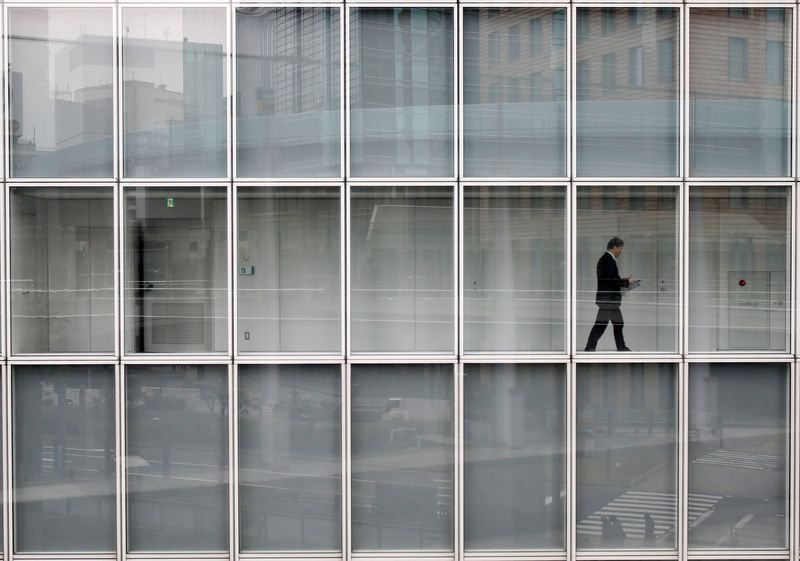By Junko Fujita
TOKYO (Reuters) - Commercial property prices in Tokyo, a bellwether for Japan's market, look to have peaked as the capital faces a glut of new offices even as the number of office workers is set to decline.
The property market had rebounded in the past three years as Prime Minister Shinzo Abe's economic policies, with ultra-low interest rates, drew in investors attracted by the wider gap than in other developed markets between returns on property and borrowing costs.
Also, as Japanese companies regained confidence, they sought more space, helping drive down office vacancy rates in the capital. Rents have been rising since 2014.
But office rents are now expected to start falling as early as next year as new space comes on to the market, analysts and commercial property owners say.
"Tokyo's office space is almost full, but if the economy turns negative, some tenants may reduce their space or move to a cheaper location," said Masashi Saio, section manager at the real estate department of Nippon Life Insurance, which owns office buildings nationwide.
"If that happens, owners of office properties may have to cut rents. We expect a large supply of office space that could affect the balance between supply and demand," he added.
Between 2018 and 2020, when Tokyo is due to host the Olympic Games, the capital expects to add 2 million square meters of new office space - equal to more than 8 percent of its total as ofmid-2016, said Shunji Kobayashi, senior manager at the real estate research team for Sumitomo Mitsui Trust Bank.
"Newer space may be filled, but there will be vacancies in older properties," he said. "Demand for new office space is not expanding because financial institutions are not growing their space like they used to."
Worries over falling rents are already feeding into property firms' share prices, with the performance of the Topix real estate index <.IRLTY.T> ranking 26th out of 33 sub-indexes last year.
Mitsui Fudosan (T:8801), one of Japan's largest property developers, is already marketing space in its Tokyo Midtown, a10-year-old office and retail complex in Roppongi, which is expected to become almost one-third vacant, a Tokyo-based broker said.
Yahoo (NASDAQ:YHOO) Japan Corp (T:4689) last year moved from the complex to the newly built Tokyo Garden Terrace, developed by Seibu Holdings Inc (T:9024). And Fast Retailing Co (T:9983), which operates the Uniqlo clothing retailer, also plans to move some of its operations out of the complex to a warehouse in a cheaper location.
To view a graphic on office rentals in Tokyo, click http://tmsnrt.rs/2isN3AP
To view a graphic on the most expensive business hubs, click http://tmsnrt.rs/2isvocK
MORE OFFICES TO LET
Tokyo's office vacancy rate has fallen in almost every month since June 2012, from 9.43 percent to 3.61 percent, said Miki Shoji, a broker, and office rents rose 10.6 percent over that period, though that increase was tempered by the prospect of so much new office space coming onstream.
The vacancy rate is expected to rise again, to around 6percent - more than the 5 percent level considered healthy - and that will push down rents from 2019, said Kobayashi at SumitomoMitsui Trust.
CBRE, a global real estate research firm, predicts Tokyo's prime office rents will fall 1 percent in 2017-18, and some new office towers will open with vacancies.
With an average annual office rent of $160 per square foot, Tokyo's Marunouchi financial district ranks sixth among global business centers, some way behind Hong Kong's Central ($290) and London's West End ($262), according to CBRE.
Predictions of falling rents have already slowed property deals, with the value of office property transactions falling 28 percent to 1.3 trillion yen ($11.37 billion) last year. Urban Research Institute, a think-tank affiliated with Mizuho Trust & Banking Co, reckons this is because prices have risen too high for investors to justify future income.
Office deals made up less than a third of all transactions last year, down from 41 percent in 2015, according to Urban Research.
Meanwhile, firms are still on the move.
Trading firm Mitsui & Co (T:8031) is due to move into a new headquarters building in mid-2020, leaving Nippon Life, the owner of its current offices in the upmarket 22-floor Marunouchi Garden Tower, to find new tenants.
As co-owner of its new headquarters, Mitsui & Co will also have to find tenants for part of the twin-tower office and retail complex that will add 360,000 square meters of new space.
The other owner, Mitsui Fudosan, is also developing a35-storey building in Hibiya, near the Imperial Palace, to be completed by next January, as well as a 31-storey tower due in the same year in Nihonbashi.
Nippon Life must also secure tenants for a 28-storey office tower due to be completed in August 2018 in Hamamatsucho.
While the office space mounts up, the Tokyo government expects the capital's workforce will have declined by nearly a tenth in the 25 years to 2035 as Japan's population shrinks.

($1 = 114.3600 yen)